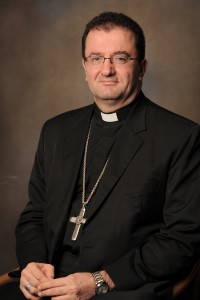
A groundbreaking book that casts a bird’s eye view over the foundations of bioethics in the world’s two largest religions was launched on 18 September at the Australian Catholic University in Sydney.
Addressing an audience of clergy and lay people, including Muslims, the book’s author, Lebanese Maronite Bishop Antoine-Charbel Tarabay, said that Bioethics at the Crossroads of Religions: Thoughts on the Foundation of Bioethics in Christianity and Islam was designed to explore, inform, promote and stimulate discussion on vital issues affecting, not only religion, but the world at large.
“At a time when ethical principles are challenged and questioned, there is a need for such a work to appear,” Bishop Tarabay pronounced. “This book is an invitation to Christianity and Islam to collaborate more on bioethical matters for the benefit and respect of human beings and humanity.”
The bishop, who was appointed by Pope Francis in 2013 as the fourth bishop of the Maronite Diocese of Australia, agreed that it was important to address specific issues such as abortion, IVF and euthanasia, and said he intended to produce a second volume dealing with these issues, but claimed he was inspired to delve into the religious and philosophical foundations of ethics and morality in his current book to provide readers with a deeper and broader insight into the roots of Christianity and Islam.
“If we do not address the foundations of our teaching, if we cannot articulate the grounds of our doctrines, we will lack faith in our own ethical positions,” he explained. “(We will) be unable to explain the wisdom of our moral doctrines to others, and be unable to make persuasive statements in defence of our faith.”
When delivering an introductory speech on the evening, Father Peter Joseph told the audience that Bishop Tarabay, with his education in Lebanon, France and Italy, was ideally suited to author such a book.
“This broad education has given him the best of East and West,” Fr Joseph said. “He has the insight into the Islamic sources and perspectives, and can read them in the original language but, at the same time, can re-present them in a modern western language, English, with the Western style of thought and structure and order.”
After defining “Bioethics” as a combination of the Greek words Bios (life) and ethos, (the system of moral values and doctrines regarding the practice of human virtue), Fr Joseph went on to describe the structure of the book, explaining how it was ordered into four parts: man as a creature of God, the significance of human sexuality, the bodily nature of man and the ethical principles in health and sickness.
Bishop Tarabay, he said, then provides the Catholic perspective on each theme, followed by the Islamic perspective, before exploring the commonalities and divergences of the two. The bishop notes similarities on issues such as human sexuality, with the prohibition of adultery, promiscuity and prostitution, but also the divergence on issues such as the dignity of the human person, of women in particular, and the sacredness of the human body which, he writes, is weak in Islam.
“It is clear that the crucial differences have their origin in the very foundation of religion, namely in the concept of God – is He our Heavenly Father, or not?” Fr Joseph stated.
When concluding his address, Bishop Tarabay acknowledged that the subject addressed in his book was too vast to be explored in one book and saw it as a stepping stone along the journey to greater understanding.
“My ultimate aim in publishing this study is to reiterate that human being and human reality cannot and should not at any time be treated as a means, but rather as an end,” he said, “because every human being, without exception, is lovingly made in the image of God.”